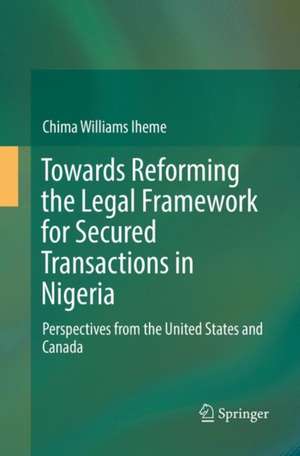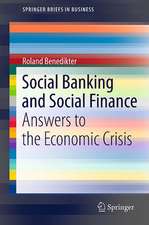Towards Reforming the Legal Framework for Secured Transactions in Nigeria: Perspectives from the United States and Canada
Autor Chima Williams Ihemeen Limba Engleză Paperback – 15 iun 2018
| Toate formatele și edițiile | Preț | Express |
|---|---|---|
| Paperback (1) | 641.03 lei 6-8 săpt. | |
| Springer International Publishing – 15 iun 2018 | 641.03 lei 6-8 săpt. | |
| Hardback (1) | 647.27 lei 6-8 săpt. | |
| Springer International Publishing – 25 aug 2016 | 647.27 lei 6-8 săpt. |
Preț: 641.03 lei
Preț vechi: 754.15 lei
-15% Nou
Puncte Express: 962
Preț estimativ în valută:
122.70€ • 133.32$ • 103.13£
122.70€ • 133.32$ • 103.13£
Carte tipărită la comandă
Livrare economică 21 aprilie-05 mai
Preluare comenzi: 021 569.72.76
Specificații
ISBN-13: 9783319824413
ISBN-10: 3319824414
Ilustrații: XVI, 291 p.
Dimensiuni: 155 x 235 mm
Greutate: 0.44 kg
Ediția:Softcover reprint of the original 1st ed. 2016
Editura: Springer International Publishing
Colecția Springer
Locul publicării:Cham, Switzerland
ISBN-10: 3319824414
Ilustrații: XVI, 291 p.
Dimensiuni: 155 x 235 mm
Greutate: 0.44 kg
Ediția:Softcover reprint of the original 1st ed. 2016
Editura: Springer International Publishing
Colecția Springer
Locul publicării:Cham, Switzerland
Cuprins
Introduction.- A Critical Review of the Current Laws on Secured Transactions in Nigeria.- A Search for Legislative Solutions vis-à-vis Nigeria's Secured Transactions Law: UCC Article 9 and Ontario PPSA Compared.- Tailor-Made Recommendations for the Reform of Nigeria's Secured Transactions Law Based on the Comparative Analysis Between UCC Article 9 and OPPSA Models.- Secured Transactions: Intersections with Bankruptcy and Consumer Protection Laws.- Conclusion: Or Why There is Still Much Work to Do.
Textul de pe ultima copertă
This book offers a valuable guide to one of the most challenging areas of commercial law, now frequently referred to as secured transactions, with a focus on Nigerian, Canadian and United States perspectives. A debtor’s ability to provide collateral influences not only the cost of the money borrowed, but also in many cases, whether secured lenders are willing to offer credit at all. The book proposes that increasing access to, and indeed, lowering the cost of credit could tremendously boost economic development, while at the same time arguing that this would best be achieved if the legal framework for secured transactions in Nigeria, and of course, any other country with similar experiences, were designed to allow the use of personal property and fixtures to secure credit. Similarly, the creation, priority, perfection, and enforcement of security interests in personal property should be simplified and supported by a framework that ensures that neither the interests of secured lenders nor debtors are hampered, so as to guarantee the continuous availability of affordable credit as well as debtors’ willingness to borrow and do business. The book further argues that in addition to the obvious preference for real property over personal property by secured lenders due to the unreformed secured-transactions legal framework in Nigeria, its compartmentalized nature has also resulted in unpredictability in commerce and the concomitant effects of poor access to credit. Through the comparative research conducted in this book utilizing the UCC Article 9 and Ontario PPSA as benchmarks, the author provides reformers with a repository of tested secured-transactions law solutions, which law reformers in the Commonwealth countries in Africa and beyond, as well as the business community will find valuable in dealing with issues that stem from secured transactions.
Caracteristici
Proper combination of theory and practice New, important addendum to comparative scholarship Evidence based research arising from a proper knowledge of the Nigerian legal and socio-economic system The Newness of the work - there is a severe lack of materials addressing the secured transactions law of Nigeria through the lens of the leading secured transactions models














